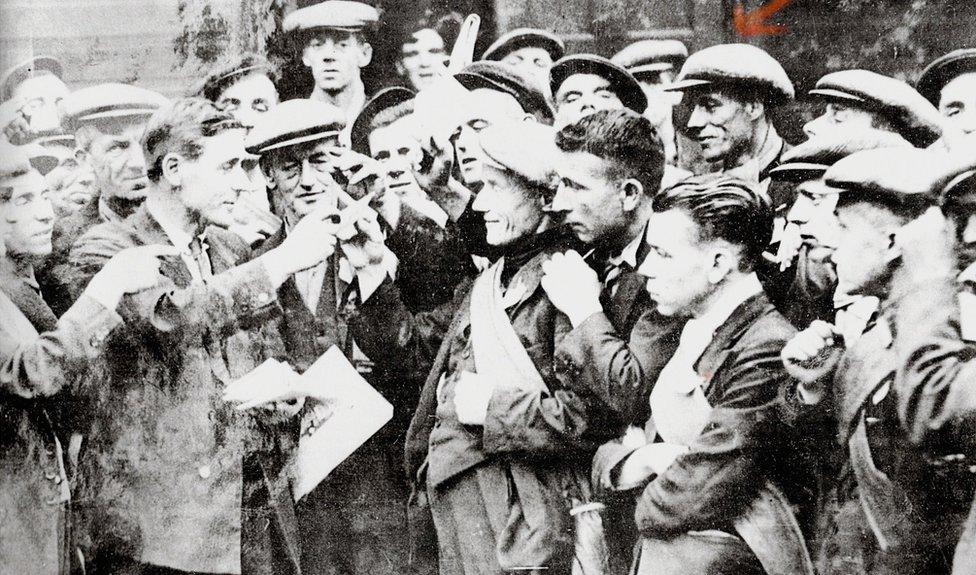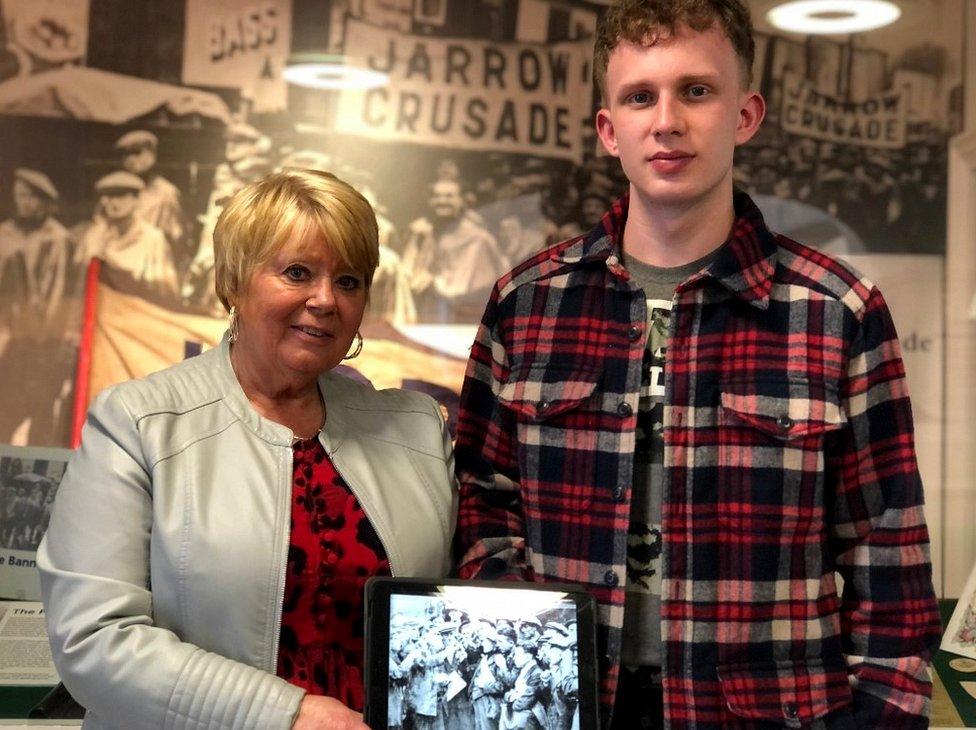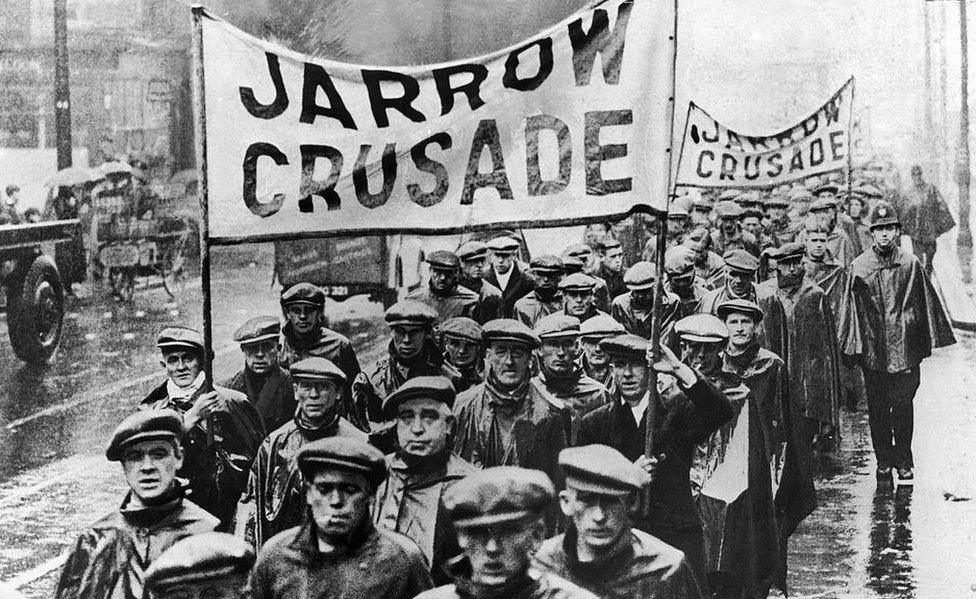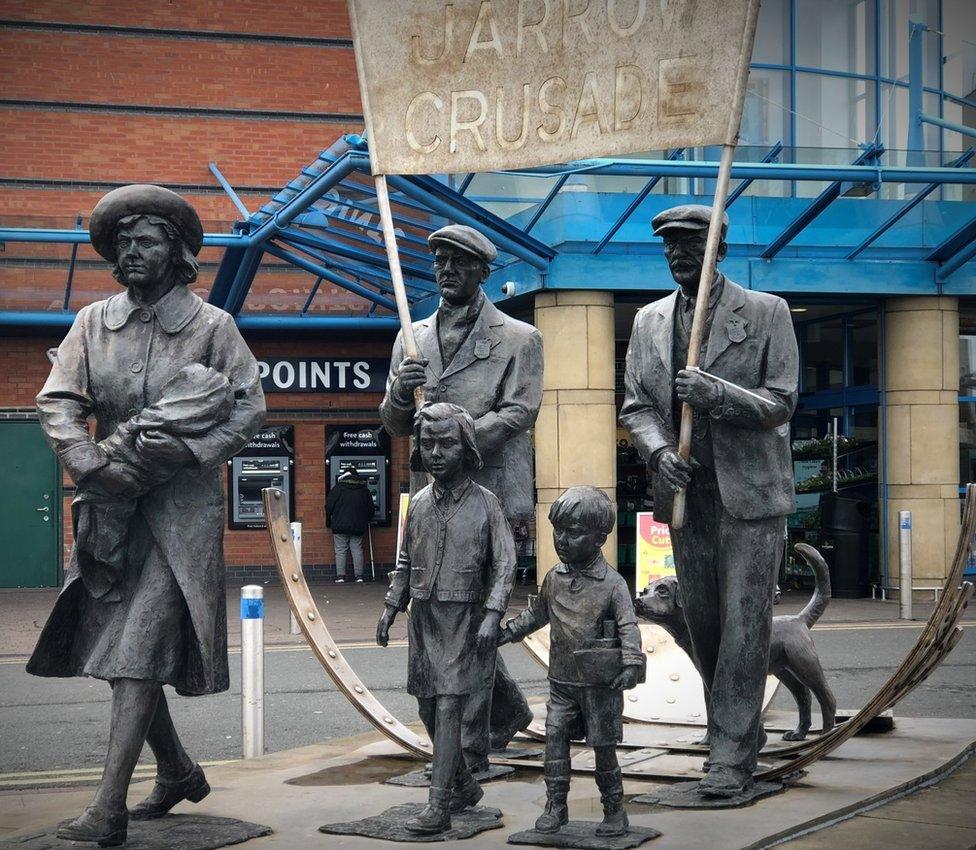'My ancestor was a Jarrow marcher - he'd be furious people are struggling'
- Published
James Lamb is a descendant of one of the Jarrow marchers
In 1936 the town of Jarrow, on the River Tyne, was suffering from desperate poverty caused by mass unemployment following the closure of its shipyard.
In a bid to highlight their plight and bring new jobs to the town, 200 men walked almost 300 miles to London in what was known as the Jarrow Crusade.
It ultimately proved fruitless but its legacy continues, especially in this corner of north-east England.
Almost 90 years later, 18-year-old James Lamb from Newcastle surveys an exhibition about the march at Jarrow Town Hall.
Among the objects on display is one of the banners carried by the men. One of those who undertook the 26-day journey was his great-great-grandfather, John Browne.
"As much as the Jarrow March itself wasn't successful in the short term, it paved the way for us to protest now against things like the cost of living," James says.

John Browne, of Chipchase Terrace, was one of the 200 who marched to London
When asked what his ancestor and the other marchers would have made of the current economic climate, he replied: "I think they would be disgusted.
"They fought so hard for future generations to be able to grow up in a world where they didn't have to live pay cheque to pay cheque, I mean that was if they were lucky.
"To see that people are still going through the same struggles that they did, after all the work they put in, I'd be furious."
The town of Jarrow in South Tyneside has a population of nearly 40,000. Labour controls the local council, although a handful of seats are held by Green, Conservative and independent councillors.
On 5 May, voters will elect one councillor in each of the borough's 18 wards.
James, a student, will vote for the first time.
"I think as tempting as it is for me to vote by party affiliation, I need to think about who the best candidate is for the people in my community," he says.
"It's going to be based on the person, not the party they represent."

Veronica Andrews says the marchers would be "hanging their heads in dismay" at the current costs of living
'Pawned suits'
James's grandmother, Veronica Andrews, grew up in Jarrow and remembers her grandad as a gentle man who rarely mentioned his part in the crusade.
She recalls her grandmother telling her that the men were given suits when they returned from London, to help them in their search for work.
"But all the suits landed up in the pawn shop," she says.
"My nana said she was too proud to go in with theirs, so she waited a couple of days and when she got there it was absolutely full - nearly all of the other Jarrow marchers' suits were there.
"She didn't think they would take it, but they did."

The Jarrow Crusade set off in October 1936 and took nearly a month to reach Marble Arch in London
A former nurse, the 68-year-old marched herself in the 1974 pay dispute, and carried one of the original Jarrow Crusade banners.
She was later inspired to go into politics and in 2021 was elected for the first time as a Labour councillor in County Durham, where she lives.
"I think they [the marchers] would find it very hard to believe that the world 86 years on is not much better compared to how it was then. They would be hanging their heads in dismay," Mrs Andrews says.
"We shouldn't have people dependent on food banks, not being being able to feed their families, and that we have children in poverty - people can't afford to heat their homes because the price of fuel has gone up so high."
'I'm not having kids'
Across Jarrow there are numerous memorials and reminders of the 1936 march.
Casting a shadow over shoppers outside Morrisons supermarket is perhaps the most striking, The Spirit of Jarrow statue.
Close by, shopper Amy Fothergill observes that the current cost of living "is too much".
"They expect us to live on that and wages don't go up - it's rubbish," she says.
"If I didn't live at home still, I would find myself moving back - it's going backwards, it's not on."
Beside her Sammii Johnstone, shopping trolley at hand, says: "I'm never going to be able to afford to move out.
"I have to use half my benefits just to pay bills, so even then I'm left with nothing.
"I'm not having kids - I'm not bringing them up in a world like this."

The Spirit of Jarrow statue commemorates the crusaders and was unveiled in 2001
Peter Shaw was holding his grandson as they waited by the statue.
"The way prices seem to be rising there has to be a limit, the government has to step in," he says.
"We don't want to go back to when interest rates on mortgages were 10 to 15%, I think that would be catastrophic and devastating.
"It's like déjà vu - things are going around in circles, you had the Great Depression in the 1930s and we don't seem to have learnt."
Local authorities in England receive special funding from the government, which can be used to help struggling families with essentials such as food, clothing and utilities.
South Tyneside Council says "the single best way to help people is through the creation of high quality jobs" and it continues to do all it can to attract business and investment into the borough.
A government spokesperson said it was investing more than £900m in the North East "as part of our mission to level up the whole of the UK" - investment it said would help to "revive the area by providing more places to work, learn and socialise."
The statement continued: "We recognise the pressures on the cost of living and we are doing what we can to help, including spending £22bn across the next financial year to support people with energy bills and cut fuel duty.
"For the hardest hit, we're putting an average of £1,000 more per year into the pockets of working families on Universal Credit, have also boosted the minimum wage by more than £1,000 a year for full-time workers and our Household Support Fund is there to help with the cost of everyday essentials."

POSTCODE SEARCH: Is there an election in my area?
WHAT'S HAPPENING WHERE: Really simple guide
ENGLAND: Simple guide


Follow BBC North East & Cumbria on Twitter, external, Facebook, external and Instagram, external. Send your story ideas to northeastandcumbria@bbc.co.uk, external.
Related topics
- Published18 April 2022
- Published2 February 2022
- Published28 March 2022

- Published19 April 2022

